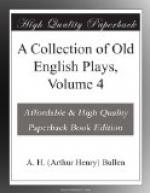Everybody knows the droll description in Heywood’s English Traveller of the “Shipwreck by Drink,"[45]—how some unthrift youths, carousing deeply, chanced to turn their talk on ships and storms at sea; whereupon one giddy member of the company suddenly conceived that the room was a pinnace, that the sounds of revelry were the bawlings of sailors, and that his unsteady footing was due to the wildness of the tempest; the illusion spread among his companions, and a scene of whimsical confusion followed. In The Captives, ii. 2, we have a similar conceit suggested:—
Scrib. Such was the grace heaven sent us, who from perill, Danger of lyfe, the extreamest of all extreames Hathe brought us to the happy patronage Of this most reverent abbott.
Clowne. What dangers? what extreames?
Scrib. From the
sea’s fury, drowneing; for last night
Our shipp was splitt, wee
cast upon these rocks.
Clowne. Sayd in a jest, in deede! Shipwreck by land! I perceive you tooke the woodden waggen for a ship and the violent rayne for the sea, and by cause some one of the wheels broake and you cast into some water plashe, you thought the shipp had splitt and you had bene in danger of drowneinge.
The main story of The Captives is borrowed from Plautus’s Rudens, many passages being translated almost word for word. It will be remembered that in the English Traveller Heywood was indebted to another of Plautus’s plays—the Mostellaria. I have not been able to discover the source of the very curious underplot of The Captives.
The MS. from which the play is printed bears every appearance of being a play-house copy. Numerous passages have been cancelled, seemingly (for the most part) by the hand of some reviser. In most instances I have restored the cancelled passages to the text—though the task of deciphering them has been cruelly difficult.
THE CAPTIVES; OR, THE LOST RECOVERED.
A Comedy by THOMAS HEYWOOD.
Licensed by Sir Henry Herbert in 1624, and now first printed from Egerton MS. 1994.
Actus primus.
SCENA PR.
Enter Mr. Raphael a younge
marchaunt, Mr. Treadway
his companione and frend.
Raphael. You talke to one thats deaf; I am resolv’d.
Treadway. I knwe [sic] you are not of that stupid sence But you will lyst to reason.
Raphael. Alls but vayne.
Treadway. You saye shees fayre.
Raphael. And there-fore to bee lov’d.
Treadway.[46] No consequent
To trust to collour. Are not the bewtyous lyllyes,
The gardens pryde and glorye of the feilds,
Thoughe to the eye fayre and delectable,
Yet ranke in smell? the stayneles swanne
With all the Oceans water cannot wash
The blacknes from her feete, tis borne with her.
Oft painted vessayles bringe in poysond cates,
And the blackest serpents weare the goldenst scales;
And woman, made mans helper at the fyrst,
Dothe oft proove his destroyer.




